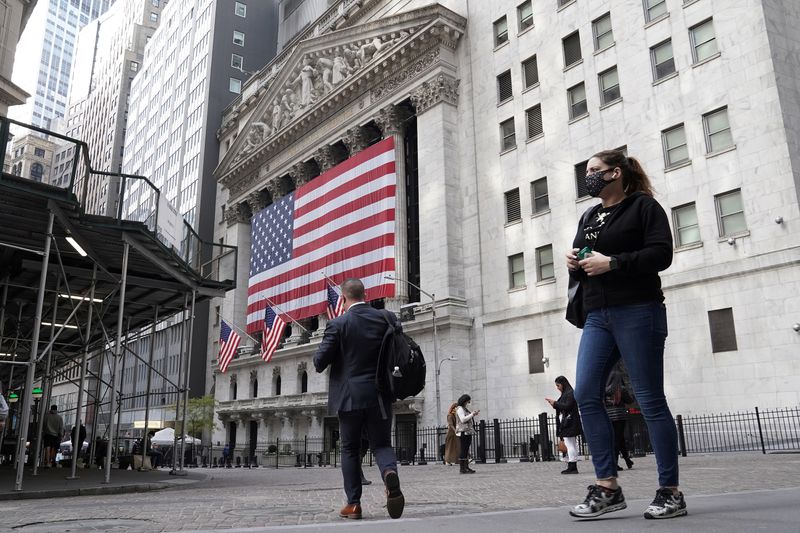Intel stock spikes after report of possible US government stake
By Geoffrey Smith
Investing.com -- President Donald Trump stirs the pot in Georgia ahead of the Senate run-offs; the U.K. begins rolling out the AstraZeneca-Oxford vaccine; the dollar weakens, pushing up commodities prices, and Iran restarts uranium enrichment in a challenge to incoming President Joe Biden. Here’s what you need to know in financial markets on Monday, January 4th.
1. Trump leans on Georgia
President Donald Trump leaned on Georgia Secretary of State Brad Raffensberger to “find” enough votes to overturn the state’s presidential election result in a telephone call lasting over an hour, according to the Washington Post and others.
A recording of the call released by the Post shows Trump repeating as fact assertions of electoral fraud that have already been thrown out by Georgia’s courts, and accusing Raffensberger of a criminal offense in reporting a faulty election result. The votes cast in Georgia have been counted three times and have confirmed a win for President-elect Joe Biden by the narrow margin of 11,779.
The immediate importance of the call, and reports of it, are its effect on likely Republican voters in Tuesday’s two runoff elections for Georgia’s two Senate seats. The Republican Party will keep control of the Senate – and its leverage over fiscal policy – for another two years if it can hold either one of the two seats.
2. U.K. rolls out Astra vaccine as cases spike
The U.K. became the first country in the world to inject people with the AstraZeneca/Oxford Covid-19 vaccine, after health regulators approved it at the end of last year.
The country is struggling with an acute spike in new infections of Covid-19, due in large part to the presence of a new strain of the virus that appears to be more contagious than its original variant. Hospitals in London are now having to transfer patients to areas more than 200 miles away, having reached full capacity in their Intensive Care Units. The Times reported that many schools are planning to stay closed at the end of the Christmas holidays in defiance of government instructions to reopen.
U.K. Prime Minister Boris Johnson warned at the weekend that the country may have to impose what would be its third national lockdown to contain the spread of the disease. Elsewhere in Europe, senior German officials indicated that Europe’s largest economy will extend its current restrictions through the end of the month, while France added another two hours to the existing curfew in its worst-hit regions.
3. Stocks set to open at new highs
U.S. stock markets are poised to start the new year at record highs, as investors continue to look through the short-term challenges of high infection rates across the globe and bet on a broad economic recovery later in the year.
By 6:30 AM ET (1130 GMT), Dow Jones futures were up 183 points, or 0.6%, while S&P 500 futures were also up 0.6% and Nasdaq 100 futures were up 0.4%.
Stocks likely to be in focus later include Tesla (NASDAQ:TSLA), which said over the weekend that it missed its 2020 delivery target of 500,000 by a whisker, and MGM Resorts (NYSE:MGM), which had an $11 billion offer rejected by U.K.-based Entain, whose technology powers its BetMGM online operations in the U.S.
4. China, Europe manufacturing surveys weaken
Manufacturing activity in China and Europe was a little less strong in December than initially thought: the Caixin Manufacturing PMI fell to 53.0, its lowest since August, while IHSMarkit’s PMI for the Eurozone was revised down to 55.2 from a preliminary estimate of 55.5. The U.K.’s was revised up to 57.5, however, its highest in three years.
In an otherwise quiet day for economic news, there will be data on U.S. construction spending for November at 10 AM ET.
Two voting members of the Federal Reserve’s Federal Open Markets Committee – Chicago’s Charles Evans and Atlanta’s Raphael Bostic – are both due to speak at the same time.
5. Dollar weakness, Iran news drive oil higher
Dollar weakness drove oil and industrial metals higher across the board, while there were also signals from the OPEC+ bloc that current restrictions on output will remain in force for another month.
By 6:30 AM ET, the dollar index, which tracks the greenback against half a dozen advanced economy currencies, was down 0.5% at 89.54, close to its lowest in over 30 months.
U.S. crude oil futures, meanwhile, were up 0.7% at $48.80 a barrel and Brent futures were up 1.2% at $52.81 a barrel. Prices were also supported by reports that Iran had resumed enriching uranium, in a direct challenge to the incoming administration of President-elect Joe Biden. The move by Iran will make it harder for Biden to rejoin the UN-backed agreement that President Trump walked away from before imposing tougher sanctions that sharply cut Iran’s oil exports.
